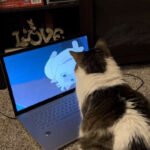Cats are natural hunters, and the sight of a cat stalking and catching a mouse is a familiar one. But as a cat owner, you might wonder, “Do Cats Eat Mice?” and more importantly, “Is it safe for them to do so?”. While a cat’s predatory instincts are strong and they are indeed capable of eating mice, there are several factors to consider regarding their health and safety.
Why Cats Hunt Mice
Hunting is deeply ingrained in feline behavior. Even well-fed domestic cats retain the instinct to hunt, a trait inherited from their wild ancestors. Mice, being small, readily available prey, often become the target of this natural hunting drive. This behavior isn’t always driven by hunger; cats may hunt and “gift” their prey to their owners as a form of bonding or simply because it’s part of their innate predatory sequence.
Is it Safe for Cats to Eat Mice? Potential Risks
While cats are equipped to handle eating raw meat and bones, consuming mice isn’t without potential risks. Here’s what you should be aware of:
Risk of Poisoning from Rodenticides
One of the primary concerns when cats eat mice is the potential for secondary poisoning. Mice are often targeted with rodenticides, or rat poison, to control pest populations. If a mouse has ingested poison, it can remain in their system and pose a threat to any animal that eats them, including your cat.
While the amount of poison in a single mouse might be small, it can still be harmful to your cat, especially if they are regular hunters or are smaller in size. The effects of rodenticide poisoning in cats can range from mild to severe, depending on the type and amount of poison ingested.
Parasitic Infections from Mice
Mice can carry various parasites, including roundworms, tapeworms, fleas, and mites. When a cat eats an infected mouse, they can become infected with these parasites themselves. Parasites can cause a range of health issues in cats, from digestive upset to more serious systemic illnesses if left untreated. Regular parasite prevention for your cat is crucial, especially if they are known to hunt.
Bone Fragment Hazards
Mice have small bones that cats can typically digest. However, there’s always a risk that a bone fragment could splinter and cause injury as it passes through the cat’s digestive system. Sharp bone shards can potentially puncture the stomach or intestines, leading to serious complications and requiring veterinary intervention. This is a less common risk, but it’s still something to be mindful of.
Signs Your Cat Might Be Sick After Eating a Mouse
If you suspect your cat has eaten a mouse, it’s important to monitor them for any signs of illness in the following 24-48 hours. Symptoms to watch for include:
- Vomiting: This could be a sign of poisoning, parasitic infection, or digestive upset.
- Diarrhea: Similar to vomiting, diarrhea can indicate various issues related to consuming a mouse.
- Lethargy or Weakness: Poisoning or infection can cause your cat to become unusually tired or weak.
- Loss of Appetite: A sick cat may refuse to eat.
- Abdominal Pain: Your cat may show signs of discomfort when their abdomen is touched, or they might be restless and unable to get comfortable.
- Coughing or Difficulty Breathing: Some rodenticides can cause respiratory distress.
- Seizures or Tremors: Neurological signs can occur with certain types of poisoning.
- Pale Gums or Bruising: Some rodenticides interfere with blood clotting, leading to these symptoms.
If you observe any of these symptoms, it’s crucial to contact your veterinarian immediately. Early intervention can significantly improve your cat’s prognosis.
How to Protect Your Cat and Home from Rodents Safely
Given the potential risks associated with cats eating mice, taking preventative measures is essential for both your cat’s safety and rodent control in your home.
Safe Rodent Control Methods for Cat Owners
- Mechanical Traps: These are a safer alternative to poisons when you have pets. Snap traps are designed to kill mice quickly and can be placed in areas inaccessible to your cat.
- Live Traps: Humane live traps allow you to catch mice without harming them. You can then release the mice far away from your home.
- Maintain Cleanliness: Proper food storage and cleanliness can help deter rodents from entering your home in the first place. Store food in sealed containers and promptly clean up any spills.
- Seal Entry Points: Inspect your home’s foundation and exterior for any cracks or holes that mice could use to enter. Seal these openings to prevent rodent access.
Rodent Control Methods to Avoid When You Have Cats
- Rodenticides (Poisons): Avoid using rat or mouse poisons both indoors and outdoors if you have cats or other pets. The risk of primary or secondary poisoning is significant.
- Glue Traps: These traps are inhumane and can also trap cats or other pets. They cause prolonged suffering for rodents and can be difficult and stressful to remove if a pet gets stuck.
- Peppermint Oil: While some sources suggest peppermint oil as a natural rodent repellent, it is toxic to cats and should not be used in areas accessible to them.
Conclusion
While it’s natural for cats to hunt and even eat mice, it’s important to be aware of the potential risks involved, particularly poisoning and parasites. By practicing safe rodent control methods and being vigilant about your cat’s health, you can help protect your feline companion. If you suspect your cat has eaten a mouse and is showing any signs of illness, don’t hesitate to consult with your veterinarian for prompt advice and care. Prioritizing your cat’s safety and well-being while managing rodents responsibly is key to a healthy and happy home for both you and your feline friend.


